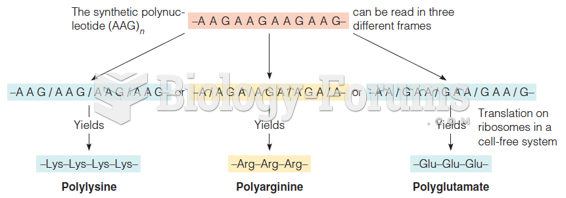|
|
|
The first oral chemotherapy drug for colon cancer was approved by FDA in 2001.
Many medications that are used to treat infertility are injected subcutaneously. This is easy to do using the anterior abdomen as the site of injection but avoiding the area directly around the belly button.
Liver spots have nothing whatsoever to do with the liver. They are a type of freckles commonly seen in older adults who have been out in the sun without sufficient sunscreen.
Each year in the United States, there are approximately six million pregnancies. This means that at any one time, about 4% of women in the United States are pregnant.
Many people have small pouches in their colons that bulge outward through weak spots. Each pouch is called a diverticulum. About 10% of Americans older than age 40 years have diverticulosis, which, when the pouches become infected or inflamed, is called diverticulitis. The main cause of diverticular disease is a low-fiber diet.
 A strike by 800 women shoemakers in Lynn, Massachusetts, in 1860. In 1851 a Lynn shoemaker had adapt
A strike by 800 women shoemakers in Lynn, Massachusetts, in 1860. In 1851 a Lynn shoemaker had adapt
 James A. Garfield lies mortally wounded. After failing to locate the bullet, surgeons called in Alex
James A. Garfield lies mortally wounded. After failing to locate the bullet, surgeons called in Alex





